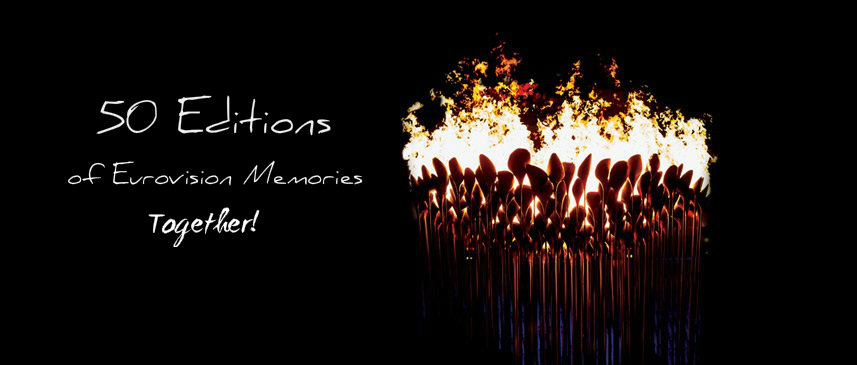 Unlike many of its counterparts, Armenia hardly got to achieve a high position in the scoreboard after their first win (and also, first win of the contest overall) on EM01. In fact, just twice they came on the top 3; and just 10 (out of 24) times they managed to go into the final. And coincidentially enough, the two entrants that came on the top 3, are the same ones that we call today, the Armenian winners: Inga & Anush and Sirusho. The four songs that have made them shine involve folk elements (three times Armenian folk, and Greek folk once); mixed with some influences from the European music scene: "Menq Enq Mer Sarerë", "Erotas", "Im Anunë Hayastan E", and the main character now... "PreGomesh". In an exciting night, Sirusho managed to get Armenia its second win after a wait of 25 editions.... On EM26, held in Gothenburg, Sweden. ABOUT THE VOTING With 169 points, "PreGomesh" became the third winning entry with most points in EM history, just behind EM11's "Kom" (representing Sweden, 202 points) and EM12's "A Night Like This" (representing the Netherlands, 173 points). It also had the second largest winning margin (that is, difference of points between the winner and the runner-up): 32 points, also shared by EM23's "Las Puertas del Pasado"; and surpassed by the 36 points margin of EM20's "Agony". PreGomesh received an average of 5,452 points; which accounts for 45,43% of the possible maximum points (which would have been 384 with 31 participating countries besides Armenia). Interestingly enough, the other Armenian winning entry, "Menq Enq Mer Sarerë", has the highest average and maximum-points-percentage: 7,455 points and 62,12%, respectively. "PreGomesh" was not a surprise win, as many had it as favourite, and specialists had labeled it as a very possible winner, next to Germany (who came 2nd), Ireland (3rd) and the United Kingdom (5th). In the grand final, it leaded (except for a few moments) the scoreboard from the start, and earned 7 sets of 12 points (coming from Andorra, Finland, Lithuania, Norway, Poland, Sweden and Switzerland), more than any other country. With this win, "PreGomesh" also became the 8th winning song to not have a single word of English; and marked the 13th a country wins with a song on its national language. In fact, only Armenia, Ireland, Italy, Spain, San Marino, the United Kingdom have had all their wins with songs in their national languages. Lastly, it is quite remarkable that the Armenian language is part of the select group of only 6 winning languages (the others are English, Italian, Spanish, Swedish and Turkish). ABOUT THE ARTIST Siranush Harutyunyan (Սիրանուշ Հարությունյան), better known by her stage name, Sirusho (Սիրուշո), is one of the most important artists of the Armenian music scene. Having started her career in Canada at the age of 7 and released four albums so far, she is very popular among the Armenian diaspora and the Eurofans community. She has also toured many countries, including Belgium, Canada, Egypt, Finland, France, Georgia, Germany, Greece, Iran, Jordan, Lebanon, Poland, Russia, Spain, Syria, Turkey and the United States. She has participated once in the Eurovision Song Contest (Belgrade 2008), giving Armenia its best result so far (4th, 199 points) with the upbeat folk song "Qélé Qélé". In the Eurovision Memories Song Contest, she has already represented Armenia three times: on EM02 with the Greek language laïko song "Erotas" (3rd, 72 points); on EM11, featuring her mother Syuzan Margaryan, with the ballad "Oror" (13th, 88 points); and this last time with "PreGomesh" (1st, 169 points). She was born on January 7, 1987 (age 26) in Yerevan, the capital of Armenia; in a family of Armenian Honored Artists (title invested by the Armenian government to recognize outstanding characters of the Armenian artistic scene): Hrachya Harutyunyan (actor and director) and Syuzan Margaryan (singer). "I have never been one of those children who dreamed of becoming a singer. I was a little kid and people would ask me to sing at events. Every time after I sang, I would see the amazed looks on their faces and I couldn't figure out the reason. I mean, I thought I wasn't doing a hard thing, I was just singing the way I felt the music." She has written most of her songs since she was 7 years old, whilst the composition is usually done by renowned Armenian composers. Her first album, Sirusho, placed her name in the commercial world with only 13 years old (2000). Her second album, Sheram, (2005) received numerous awards and earned her the title of Best Female Artist of the Year. In 2006 she made the charts again with the hit "Mez Vochinch Chi Bajani" (which participated in the Armenian National Final for EM11), a song dedicated to Varduhi Vardanyan, the most famous Armenian female artist of the XXth century. The album Hima (2007) best describes what Sirusho represents in the Armenian Music: a breakthrough. This album incorporates soul and R&B elements, with the traditional Armenian instruments, like the duduk (brass instrument), zurna (high-pitch brass instrument) and dhol (drum). In 2008 she was for the fourth time named Best Female Artist of the Year, and was selected for Eurovision, where her song "Qélé Qélé" became a hit and earned the most sets of 12 points (8). And in 2009, she released "Erotas", as a hommage to her Greek fans; got married with Levon Kocharyan; and partnered up with Jelena Tomašević and Boaz Mauda to perform "Time To Pray". In 2010 her album Havatum Em was released; and since then, she has released other two singles, "I Like It" and "PreGomesh" that will be included in her upcoming 2013 studio album. She has also participated in festivals, live concerts and the Junior Eurovision Song Contest. ABOUT THE SONG "PreGomesh" (ՊռեԳոմեշ) is a song composed by Sirusho and written by Avet Barseghyan (who you might remember as the male host of the 2011 Junior Eurovision Song Contest), that took Komitas Vardapet's "Lorva Gutanerg" as inspiration (Komitas is recognized as the father of Armenian Modern Classical Music). The title has a symbolic meaning, as it comes from the word "Գոմեշ" (Gomesh) and the onomatopoeic "Պռե" (Pre). The former means 'Buffalo', and the latter is the sound made in order to make cattle move. The buffalo represents the capacity of overcoming any obstacle in our lives, and here, it specially symbolizes the Armenian spirit and history. The intro is actually a piece of "Lorva Gutanerg", but then it fades into some special sound effects that open the way for a duduk and Sirusho's voice. Then, it changes into a dance/club background beat that incorporates a faster tempo in the bridge and changes to a much stronger rhythm in the chorus, which in turn ends with a small upbeat dhol (Armenian drum) section. The video, shot in location near Yerevan, includes several outfits and choreographies that are somehow related to the Armenian tradition. To end this article, here are the lyrics and the video of the song. Enjoy! LYRICS IN ARMENIAN (WITH TRANSCRIPTION)
Ել ու թող իմանա աշխարհը, (Yel u togh imana aškharhë,) Որ արդար է քո ճանապարհը, (Vor ardar e k'o čanaparhë,) Ել ու թող, որ ազնիվ կռիվդ, (Yel u togh, vor azniv trrivd,) Երկնքում հաստատի պատիվդ: (Yerknk'um hastati pativd.) Պռե՛գոմեշ (Prre! Gomesh) Ա՛ռ հա՛ գոմեշ (Arr ha! Gomesh) Պռե՛րե՛ գոմեշ (Prre-re! Gomesh) Ա՛ռ հա՛ գոմեշ (Arr ha! Gomesh) Տա՛ր հա՛ գոմեշ (Tar ha! Gomesh) Պռե՛րե՛ գոմեշ (Prre-re! Gomesh) Նա անհնազանդ է ու քար, (Na anhnazand e u k'ar,) Աչքերում ապրում է լուռ պայքար, (Ač'k'erum aprum e lurr payk'ar,) Կյանքը հողի հետ մենամարտ, (Kyank'ë hoghi het menamart,) Հաղթահարում է իր հոգով անպարտ: (Haght'aharum e hi hogov anpart.) Մեկն է բնության օրենքը (Mekn e bnut'yan orenk'ë) Կամքն ուժեղ գտնում է ելքը (Kamk'n užegh gtnum e yelk'ë) Ու շարունակում տալ սերունդներ, (U šarunakum tal serundner,) Մեկն է բնության պահանջը, (Mekn e bnut'yan pahanǰë,) Որ մտքից հանի նահանջը (Vor mtk'ic' hani nahanǰë) Չի կարող երբեք նա հանձնվել... (Č'i karogh yerbeq na handznvel...) Ել ու թող իմանա աշխարհը, (Yel u togh imana aškharhë,) Որ արդար է քո ճանապարհը, (Vor ardar e k'o čanaparhë,) Ել ու թող, որ ազնիվ կռիվդ, (Yel u togh, vor azniv trrivd,) Երկնքում հաստատի պատիվդ: (Yerknk'um hastati pativd.) Ել ու թող իմանա աշխարհը, (Yel u togh imana aškharhë,) Որ արդար է քո ճանապարհը, (Vor ardar e k'o čanaparhë,) Ել ու թող, որ ազնիվ կռիվդ, (Yel u togh, vor azniv trrivd,) Երկնքում հաստատի պատիվդ: (Yerknk'um hastati pativd.) Պռե՛գոմեշ (Prre! Gomesh) Ա՛ռ հա՛ գոմեշ (Arr ha! Gomesh) Պռե՛րե՛ գոմեշ (Prre-re! Gomesh) Ա՛ռ հա՛ գոմեշ (Arr ha! Gomesh) Տա՛ր հա՛ գոմեշ (Tar ha! Gomesh) Պռե՛րե՛ գոմեշ (Prre-re! Gomesh) Ցավն են անցկացնում դանդաղ (C'avn en anc'kac'num dandagh) Սարերից հոսող ջրերը պաղ, (Sareric' hosogh ǰrerë pagh,) Տաք արյունը գույնն է բախտի (Taq aryunë guynn e bakhti) Բռնած ուղիդ ոչինչ էլ չի խախտի... (Brrnats ughid voč'inč' yel č'i khakhti...) Ել ու թող իմանա աշխարհը, (Yel u togh imana aškharhë,) Որ արդար է քո ճանապարհը, (Vor ardar e k'o čanaparhë,) Ել ու թող, որ ազնիվ կռիվդ, (Yel u togh, vor azniv trrivd,) Երկնքում հաստատի պատիվդ: (Yerknk'um hastati pativd.) Dhol solo and vocal improvisation Պռե՛գոմեշ (Prre! Gomesh) Ա՛ռ հա՛ գոմեշ (Arr ha! Gomesh) Պռե՛րե՛ գոմեշ (Prre-re! Gomesh) Ա՛ռ հա՛ գոմեշ (Arr ha! Gomesh) Պռե՛գոմեշ (Prre! Gomesh) Ա՛ռ հա՛ գոմեշ (Arr ha! Gomesh) Պռե՛րե՛ գոմեշ (Prre-re! Gomesh) Ա՛ռ հա՛ գոմեշ (Arr ha! Gomesh) Տա՛ր հա՛ գոմեշ (Tar ha! Gomesh) Պռե՛րե՛ գոմեշ (Prre-re! Gomesh) Ել ու թող իմանա աշխարհը, (Yel u togh imana aškharhë,) Որ արդար է քո ճանապարհը, (Vor ardar e k'o čanaparhë,) Ել ու թող, որ ազնիվ կռիվդ, (Yel u togh, vor azniv trrivd,) Երկնքում հաստատի պատիվդ: (Yerknk'um hastati pativd.) Երկնքում հաստատի պատիվդ: (Yerknk'um hastati pativd.) Երկնքում հաստատի պատի... (Yerknk'um hastati pati...) Երկնքում հաստատի պատի... (Yerknk'um hastati pati...) Երկնքում հաստատի պատիվդ՛ (Yerknk'um hastati pativd!) ENGLISH TRANSLATION OF THE LYRICS Arise, and let the whole world know That your path is just fair Arise, and let your fair fight In heaven approve your honour (Prre, Arr ha, Prre-re, and Tar ha, are all onomatopoeics for the sounds farmers make to make the cattle move) Prre! Buffalo! Arr ha! Buffalo! Prre-re! Buffalo! Arr ha! Buffalo! Tar ha! Buffalo! Prre-re! Buffalo! He is disobedient and courageous In the eyes of silent struggle A lifetime duel with Earth Overcomes his unbending soul The law of nature is one for all The strong soul finds a way And continues to breed (reproduces) The requirement of nature is one So that one does not think about Retreating and/or giving up Arise, and let the whole world know That your path is just fair Arise, and let your fair fight In heaven approve your honour Arise, and let the whole world know That your path is just fair Arise, and let your fair fight In heaven approve your honour Prre! Buffalo! Arr ha! Buffalo! Prre-re! Buffalo! Arr ha! Buffalo! Tar ha! Buffalo! Prre-re! Buffalo! They slowly relieve pain, The cold waters from a mountain stream Hot blood is the colour of fate Does not violate the path chosen for thee Arise, and let the whole world know That your path is just fair Arise, and let your fair fight In heaven approve your honour Dhol solo and vocal improvisation Prre! Buffalo! Arr ha! Buffalo! Prre-re! Buffalo! Arr ha! Buffalo! Prre! Buffalo! Arr ha! Buffalo! Prre-re! Buffalo! Arr ha! Buffalo! Tar ha! Buffalo! Prre-re! Buffalo! Arise, and let the whole world know That your path is just fair Arise, and let your fair fight In heaven approve your honour In heaven approve your honour In heaven approve your ho- In heaven approve your ho- In heaven approve your honour
1 Comment
|
Archives
December 2023
|
||||||||||||








 RSS Feed
RSS Feed

